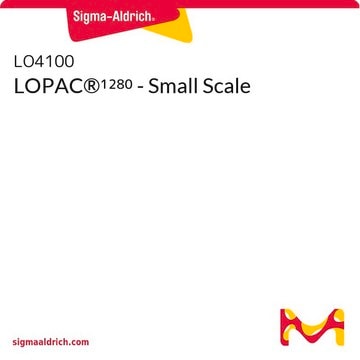R7150
Ro 25-6981 hydrochloride hydrate
≥98% (HPLC), powder
Sinónimos:
(αR)-(4-Hydroxyphenyl)-(βS)-methyl-4-(phenylmethyl)-1-piperidinepropanol hydrochloride hydrate
About This Item
Productos recomendados
Quality Level
assay
≥98% (HPLC)
form
powder
storage condition
desiccated
color
white
solubility
DMSO: >20 mg/mL
originator
Roche
SMILES string
O.Cl.C[C@@H](CN1CCC(CC1)Cc2ccccc2)[C@@H](O)c3ccc(O)cc3
InChI
1S/C22H29NO2.ClH.H2O/c1-17(22(25)20-7-9-21(24)10-8-20)16-23-13-11-19(12-14-23)15-18-5-3-2-4-6-18;;/h2-10,17,19,22,24-25H,11-16H2,1H3;1H;1H2/t17-,22+;;/m0../s1
InChI key
FEINQVNMUYISNW-HVDCVHHPSA-N
Gene Information
human ... GRIN2B(2904)
Application
- as NR2B antagonist for microinjecting rats to study the contribution of NR2B- and NR2A-containing N-methyl-D-aspartate receptors (NMDARs) to the formation of trace and contextual memory in prefrontal cortex (PL)
- as NR2B antagonist to study the effect of the protein expression of hypoxic-ischemic injury NMDAR subunits 2A and 2B in the SVZ of neonatal rats
- to induce deleterious effects upon memory consolidation and long-term potentiation (LTP) generation in the hippocampus
Biochem/physiol Actions
Features and Benefits
signalword
Warning
hcodes
Hazard Classifications
Eye Irrit. 2 - Skin Irrit. 2 - STOT SE 3
target_organs
Respiratory system
Storage Class
11 - Combustible Solids
wgk_germany
WGK 3
flash_point_f
Not applicable
flash_point_c
Not applicable
ppe
dust mask type N95 (US), Eyeshields, Gloves
Certificados de análisis (COA)
Busque Certificados de análisis (COA) introduciendo el número de lote del producto. Los números de lote se encuentran en la etiqueta del producto después de las palabras «Lot» o «Batch»
¿Ya tiene este producto?
Encuentre la documentación para los productos que ha comprado recientemente en la Biblioteca de documentos.
Los clientes también vieron
Artículos
DISCOVER Bioactive Small Molecules for Neuroscience
DISCOVER Bioactive Small Molecules for Neuroscience
DISCOVER Bioactive Small Molecules for Neuroscience
DISCOVER Bioactive Small Molecules for Neuroscience
Nuestro equipo de científicos tiene experiencia en todas las áreas de investigación: Ciencias de la vida, Ciencia de los materiales, Síntesis química, Cromatografía, Analítica y muchas otras.
Póngase en contacto con el Servicio técnico















